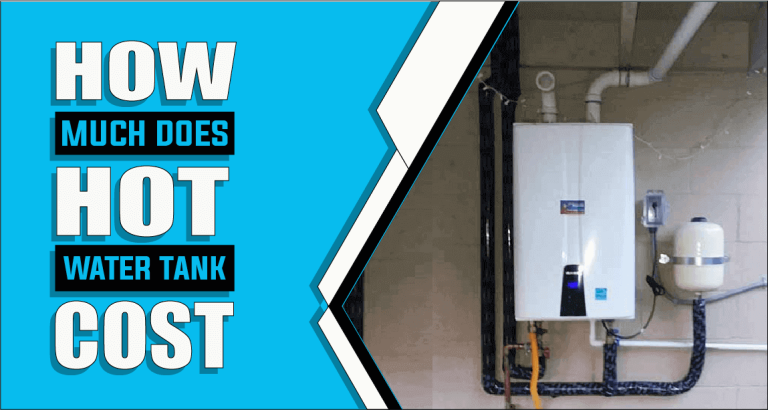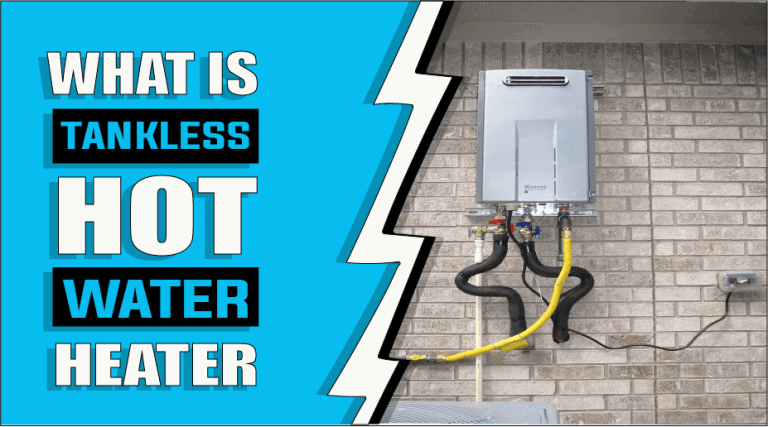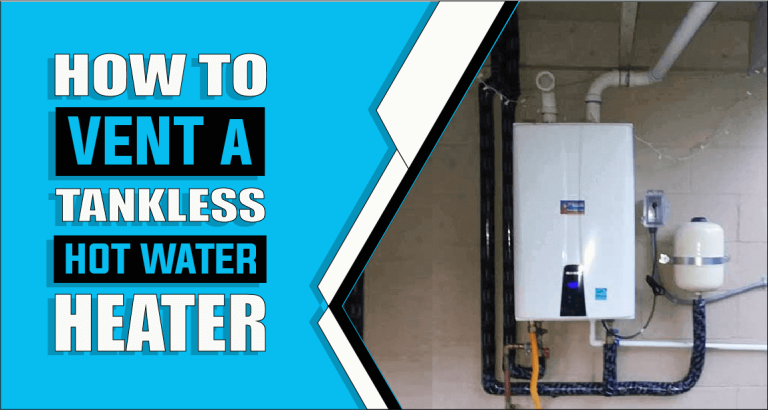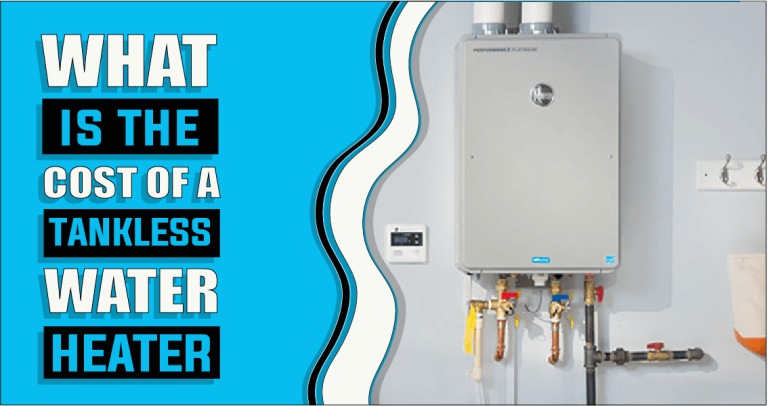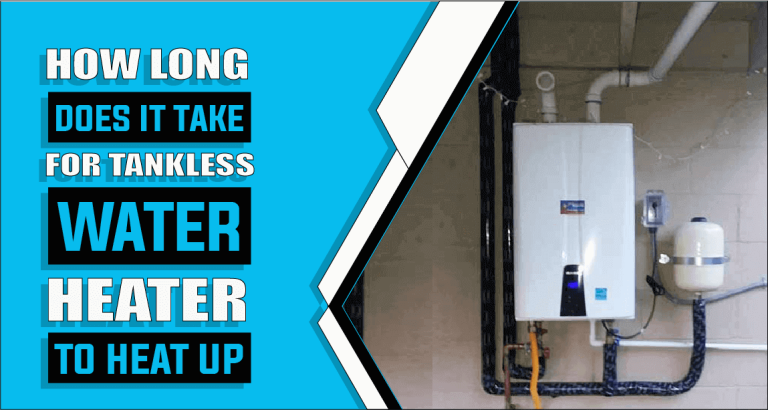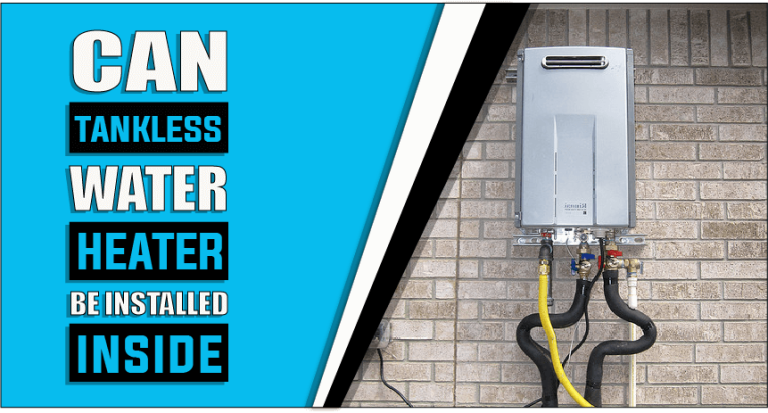Can Tankless Water Heaters Be Electric – The Truth Reveals
As a homeowner, one of the most important appliances you could have is a reliable water heater. So are you the one considering buying a tankless water heater while they are most commonly powered by gas, can tankless water heaters be electric too? Absolutely! Tankless water heaters that run on electricity are a great choice if you’re looking for an energy-efficient and convenient way to heat your water. In this blog post, we’ll discuss why electric tankless water heaters are the best choice for any household and examine some of the advantages they offer compared to traditional models. From savings on energy bills to increased hot water availability, read on to dig deep into all things related to electric tankless heaters so that you can make the right choice for your home appliance needs.
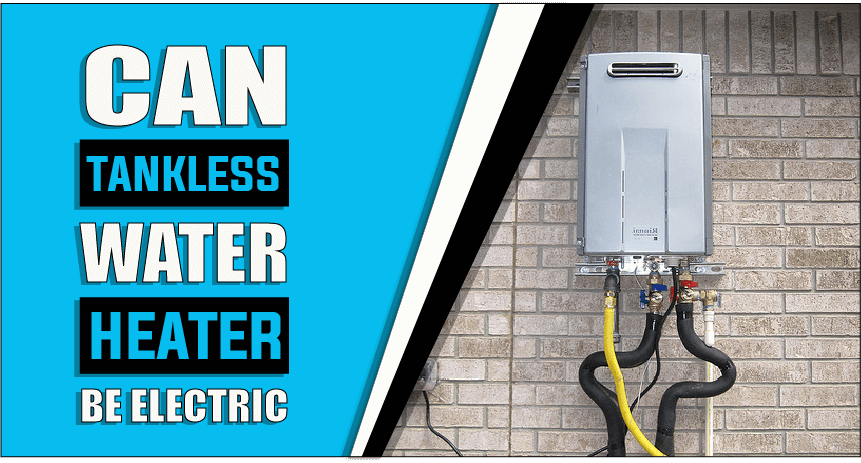
Let’s explore can tankless water heaters be electric.
Tankless water heaters are an energy-efficient alternative to traditional tank-style water heaters. They provide hot water on demand and can reduce energy consumption by up to 50 percent when compared to storage tank units. Tankless water heaters are available in both gas and electric models. Gas-powered units use propane or natural gas to heat the water, while electric versions rely on electricity as their power source.
Furthermore, in addition to offering a more efficient solution, electric tankless water heaters also offer several advantages over gas-powered versions. They require less maintenance since there is no need for an external fuel source like propane or natural gas. Additionally, they also tend to have a longer lifespan since they don’t have any moving parts that can wear out or break down over time. Electric units also don’t produce any emissions and are safer than their gas counterparts due to the lack of combustion involved in their operation. Electric versions also don’t require any special venting or exhaust systems like those found in most gas-powered models which can help reduce installation costs. On top of all this, electric units may be eligible for rebates from utility companies if installed properly according to local regulations and codes.
Electric tankless water heaters are not without their drawbacks, however; depending on your local climate, you may need multiple units installed throughout the house to properly heat all areas evenly and efficiently due to the relatively lower power output of these systems compared to gas models, this may lead to higher upfront installation costs as well as increased utility bills in colder climates where extra heating capacity is needed for effective performance. In the end, electric tankless water heaters offer many advantages over traditional tank-style models; making them an appealing choice for people looking for greater efficiency combined with the convenience of hot water on demand at all times!
Electric Tankless Water Heaters: How Do They Work?
Electric tankless water heaters work by heating water on demand, as opposed to storing heated water in a tank like traditional water heater systems. This eliminates the need for a large storage tank and allows greater flexibility in where the unit can be placed.
Electric tankless water heaters contain a flow-sensitive switch or motion sensor that activates when the tap is opened, allowing electricity to flow through an internal element, usually made of copper or stainless steel, which is submerged in cold water. As the element heats, the temperature of the incoming cold water increases until it reaches its desired level as set by the thermostat within the unit.
The thermostat controls how much energy is used to heat the incoming cold water and determines how long it takes for it to reach its desired temperature. As soon as it does, the flow-sensitive switch cuts off the electricity supply to prevent any further heating.
The Benefits of Electric Tankless Water Heaters
When it comes to hot water delivery, an electric tankless water heater has many advantages over a gas-powered model, such as lower energy costs and greater efficiency. These benefits make electric tankless water heaters more attractive, particularly if you’re looking to save money on your utility bills.
1: Lower Energy Consumption
Electric tankless water heaters are incredibly efficient, using up to 60% less energy than a standard tank heater. This is mainly because traditional tank heaters need to constantly use energy to keep a large volume of water heated, while electric tankless systems only heat the precise amount of water you need when you need it. By eliminating the need for a continuously-heated supply, electric tankless models can help you save money on your monthly electricity bills.
2: Reduced Maintenance Needs
As with all types of water heaters, regular maintenance is important to keep them working properly and reduce the risk of problems such as corrosion or sediment buildup. However, electric tankless models require fewer maintenance tasks due to their simpler design. And since there’s no tank for sediment buildup, there’s no need for periodic flushing or draining, saving both time and hassle.
3: Extended Product Lifetime
Electric tankless models don’t have an exposed storage unit with potential corrosion issues or other wear-and-tear related problems, so these systems typically last longer than their counterparts, especially if properly maintained over time with regular checkups and cleaning. On average, these systems can typically last up 20 years or more depending on usage levels and quality of care, making them a great long-term option for those looking for reliable performance over the long run.
4: Potential Financial Savings
Not only can electric tankless models help lower your monthly energy costs, but they may also be eligible for rebates from local utility companies in certain areas which can further reduce your upfront costs when installing one of these units in your home or business. Additionally, you may also be able to save even more money by taking advantage of tax credits specifically designed for those who install energy-efficient products in their homes or businesses.
5: Improved Safety Features
Electric tankless water heaters are designed with improved safety features that make them safer overall compared to traditional tanks, such as dual thermal protection and built-in reset buttons that automatically shut off power if anything begins operating outside its normal range or temperature settings. Additionally, many newer models come equipped with additional features like programmable timers which allow users to set specific times when hot water will be available, further increasing convenience while providing additional layers of security at the same time!
Disadvantages of Electric Tankless Water Heaters
Including some benefits, there are also potential drawbacks associated with using an electric tankless water heater, compared to gas-powered models in certain cases.
1: Higher Upfront Costs
Firstly, the upfront cost of purchasing and installing an electric tankless water heater will often be higher than that of a gas-powered water heater, as the components that make up an electric version are typically more expensive. This is due in part to the fact that electric tankless heaters require expensive components such as a power switch and an external control module.
2: Lower Energy Efficiency
Additionally, while electric-powered tankless heaters can provide hot water on demand, they are not always as energy efficient as their gas counterparts. This is because the electricity used for heating must first pass through the electrical system before being converted into usable heat energy, leading to increased electrical usage and higher utility costs over time.
3: Doesn’t Work At its Best In Limited Availability of Electricity Regions
Another disadvantage of using an electric tankless water heater is that it may not be available in certain areas due to limited access to electricity. While most homes and businesses across the United States have access to electricity, there are still some regions where power lines are either nonexistent or unreliable due to weather events or other disruptions in service. In these cases, it would not be feasible for someone living or working in such an area to install an electric tankless water heater. Furthermore, even if access to electricity is available, local regulations may restrict the installation of certain types of appliances or prohibit them altogether due to safety concerns or environmental factors such as air pollution caused by burning fossil fuels.
Ultimately, when considering whether an electric tankless water heater is right for your home or business, it’s important to weigh all potential pros and cons carefully before making a decision. You should take into account factors like initial cost and potential savings over time, as well as the availability of electricity in your area. Doing so will help ensure you make the best choice when selecting equipment that meets your hot water needs now and into the future.
Electrical Requirements for Installing an Electric Tankless Water Heater
When considering the electrical requirements for installing an electric tankless water heater in your home or business, it is important to understand the amount of wattage your home or business will require and the recommended circuit breaker size.
1: Amount of Wattage
Your electric supply must have a sufficient number of watts available to power the tankless water heater properly. The wattage requirement for a tankless water heater can vary depending on the size, model, and number of elements utilized. Generally speaking, most residential and commercial models may require anywhere from 15-200 kW of power and some larger industrial units may even require up to 500 kW or more.
2: Recommended Circuit Breaker Size
In addition to knowing your available wattage, it is also important to consider the proper circuit breaker size for your unit’s installation. Overloading an electrical circuit by providing too much power can damage both equipment and wiring due to excessive heat buildup. Most manufacturers will provide a minimum amperage rating that should be used when installing their devices. As a general rule of thumb, it is typically recommended that you use a double-pole 240-volt circuit breaker which offers a 30 amp capacity per pole (60 amp total). However, it is always important to consult the manufacturer’s specifications before beginning any installation process as this recommendation may vary based on individual models and sizes.
Properly sizing up your electrical requirements before installation can help ensure that your electric tankless water heater runs safely and efficiently while also helping you avoid costly mistakes down the line. It is also important to remember that any wiring modifications or upgrades should only be done by qualified professionals with knowledge of local building codes and safety regulations. If done incorrectly, these modifications can lead to dangerous situations such as fire hazards or electrocution risks so make sure you are working with professionals who are knowledgeable in this area before undertaking any electrical work yourself!
How to Install an Electric Tankless Water Heater?
Installing an electric tankless water heater can be a complicated job, but it doesn’t have to be. With the right preparation and knowledge, you can install one in your home with ease. In this article, we’ll cover all the steps necessary for installing an electric tankless water heater correctly.
What do you need?
Before you begin, make sure you have all the necessary tools and materials on hand. This includes:
- Electrical Wire
- Water Line Connectors
- Tankless Water Heater Power Supply
- Shut Off Valve
- Electrical Outlet Boxes
Step 1: Prepare your electric tankless water heater for installation
Before you begin the installation process, you will need to make sure your electric tankless water heater is ready for installation. First, inspect your unit for any damage that may have occurred during shipping or handling. Next, read and follow all of the instructions in the manual that came with your electric tankless water heater. Finally, check with your local codes to ensure that all electrical wiring and installation requirements are met.
Step 2: Install the shut-off valve
The first step in installing an electric tankless water heater is to install a shut-off valve, which will help regulate the water flow and pressure when the unit is turned on. The shut-off valve should be installed before the water line connects to the tankless water heater. This will help ensure that no damage occurs if the unit needs to be serviced or replaced in the future.
Step 3: Connect the electrical power supply
Once the shut-off valve has been installed, you’ll need to connect an electrical power supply to the electric tankless water heater. This will ensure that the unit has the necessary power to operate. First, make sure you have one of the correct size electrical outlet boxes and then connect it to the power supply using appropriate wiring techniques.
Step 4: Connect the water lines
After connecting the electrical power supply, you’ll need to connect the water lines that will supply water to your tankless water heater. This is usually done with a special connector and requires adherence to local codes and regulations. Make sure you use the correct size connectors for your specific unit.
Step 5: Test the system
Once the electric tankless water heater is installed and connected to the power supply and water lines, you’ll need to test the system. First, turn on all of the water sources in your home and check for any leaks. Next, turn on the electric tankless water heater and make sure it is running properly. Finally, test each of your fixtures to make sure they are operating correctly.
Step 6: Get a professional inspection
Once you’ve tested the system and are satisfied that it is functioning properly, it’s a good idea to get a professional inspection of your electric tankless water heater installation. Professional inspectors can check for any electrical or plumbing issues that may cause problems down the road. This will ensure your system is installed correctly and operating safely.
Following these steps can help make sure that your electric tankless water heater is installed correctly and provide you with reliable hot water for years to come. By taking the time to properly prepare, research, and install your electric tankless water heater, you’ll enjoy the added convenience and cost savings that come with this type of water heater.
Maintenance Tips for Electric Tankless Water Heaters
Here are some things to do for keeping your electric tankless water heater running smoothly over time:
- Check all connections regularly to ensure tightness.
- Conduct regular flushing with vinegar or citric acid to prevent mineral buildup in pipes or fixtures connected to your unit.
- Check the water pressure before installation and make any necessary adjustments.
- Have your unit inspected annually by a qualified technician to ensure optimum performance
- Replace any worn or damaged parts as soon as possible to reduce the risk of further damage occurring.
- Change out the anode rod every 1-2 years to help protect your unit from corrosion and sediment buildup.
- Ensure there is adequate ventilation around the unit to avoid overheating and potential fire hazards.
- Finally, make sure that you are closely following all safety guidelines provided by the manufacturer.
Electric tankless water heaters can be a great choice for homeowners or businesses who want an efficient and cost-effective way to heat their hot water. However, it is important to understand the electrical requirements before purchasing and properly size up any potential installation project to ensure safety and optimal performance. Following these tips and guidelines will help you get the most out of your tankless water heater for years to come.
Frequently Asked Questions
While gas-powered tankless water heaters generally provide more consistent hot water, electric models can be cheaper to install and are often considered an economically friendly alternative. Ultimately, it is important to consider your individual needs when selecting the best type of tankless water heater for your home or business.
Tankless electric water heaters are a great choice for homeowners or businesses looking to save money on their energy bills and reduce their environmental footprint. These types of systems offer superior energy efficiency, require minimal maintenance, and can provide hot water almost instantly.
The cost of installation can vary greatly depending on the type and size of the unit you are purchasing, as well as any necessary electrical upgrades. Generally, it is advisable to consult with a qualified professional to determine an accurate estimate for your specific situation.
Conclusion
So in conclusion of this article, can tankless water heaters be electric? Yes, electric tankless water heater models are a great choice for those looking to save money on their energy bills and reduce their environmental footprint. However, it is important to ensure that any installation project is properly sized and performed in compliance with local building codes and safety regulations by a qualified technician. With the right information and maintenance tips, you can enjoy years of reliable hot water with your electric tankless water heater.
Ella John is passionate about helping her readers make the best choice when purchasing a heater. She understands that selecting a heater can be difficult and strives to provide information to help make the decision easier. Ella’s website, Heatersinfo.com, provides valuable insight into heating trends and types of heaters and tips on how to care for them. She also advises selecting the right heater based on individual needs and preferences. Her expertise in electronics makes her an excellent source of knowledge, and she is confident that anyone who visits her website will find the perfect heater information for their needs. Ella’s dedication to helping others make educated decisions about buying the right heater is unparalleled, and she hopes to continue offering her expertise for many years. With Ella’s help, finding the perfect heater can be a breeze!

